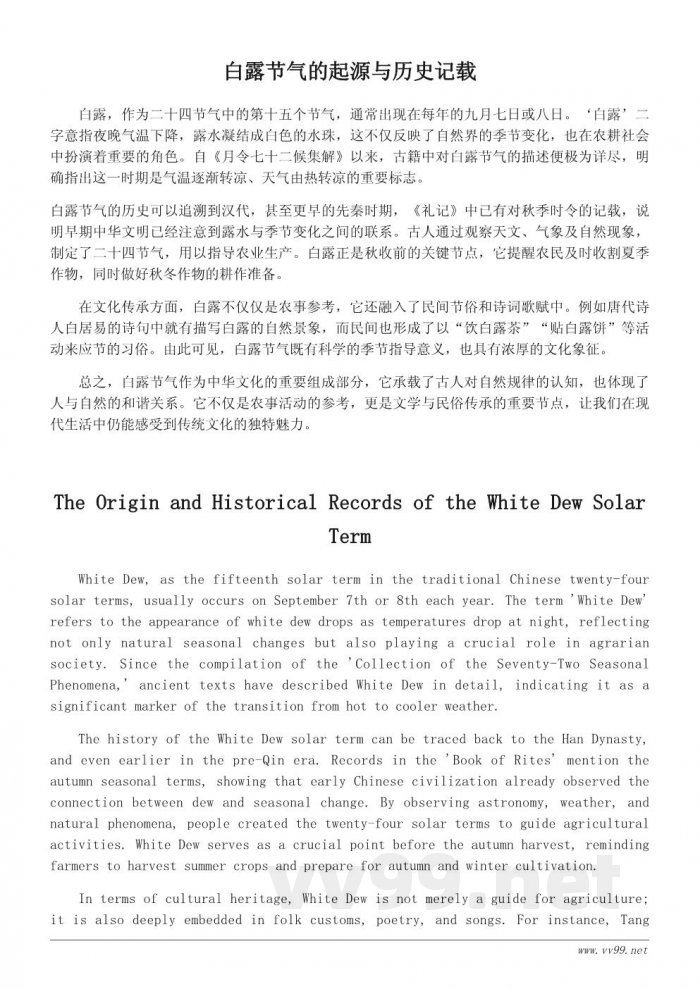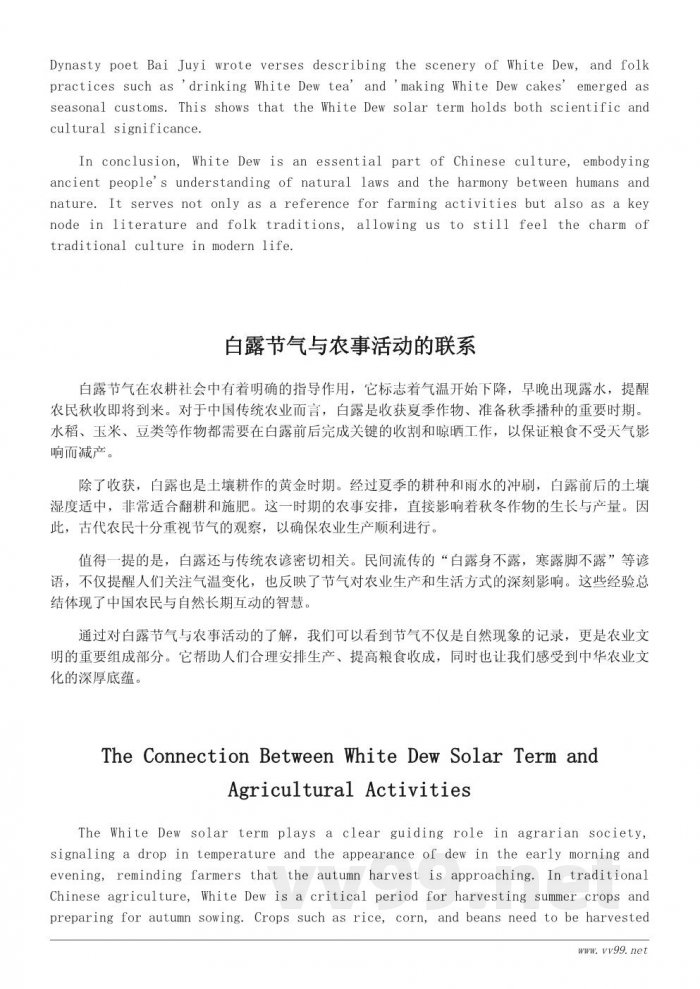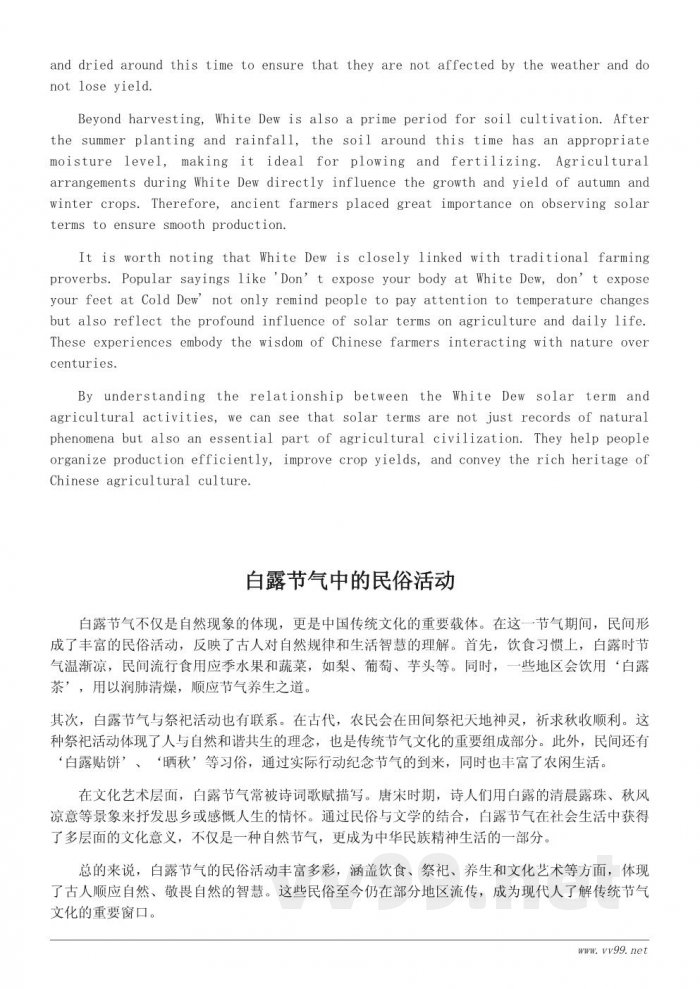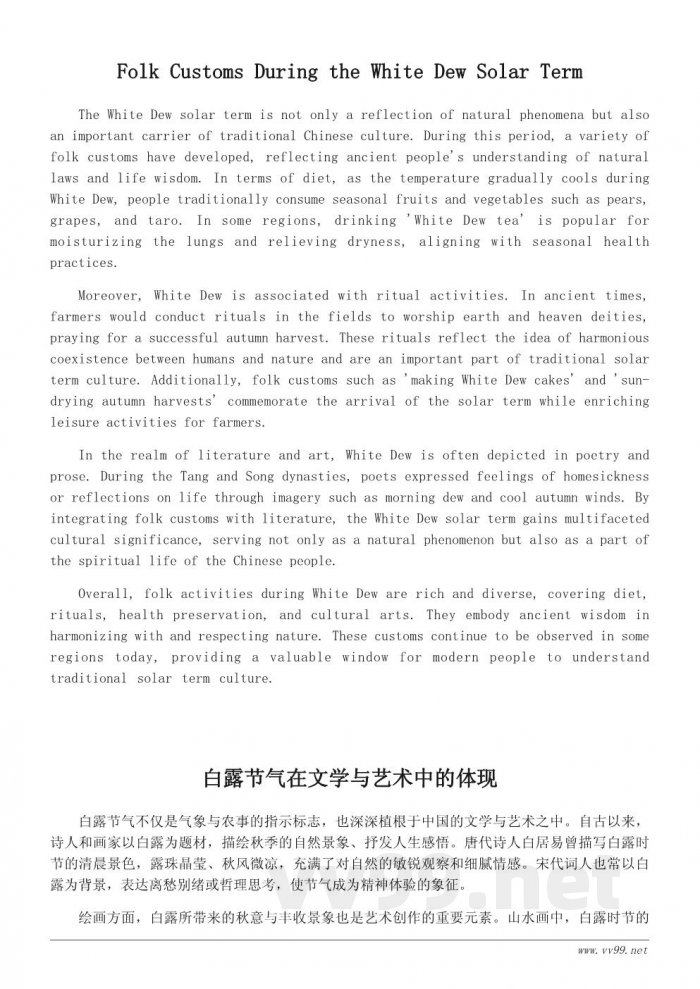白露节气的起源与历史记载
白露,作为二十四节气中的第十五个节气,通常出现在每年的九月七日或八日。‘白露’二字意指夜晚气温下降,露水凝结成白色的水珠,这不仅反映了自然界的季节变化,也在农耕社会中扮演着重要的角色。自《月令七十二候集解》以来,古籍中对白露节气的描述便极为详尽,明确指出这一时期是气温逐渐转凉、天气由热转凉的重要标志。
白露节气的历史可以追溯到汉代,甚至更早的先秦时期,《礼记》中已有对秋季时令的记载,说明早期中华文明已经注意到露水与季节变化之间的联系。古人通过观察天文、气象及自然现象,制定了二十四节气,用以指导农业生产。白露正是秋收前的关键节点,它提醒农民及时收割夏季作物,同时做好秋冬作物的耕作准备。
在文化传承方面,白露不仅仅是农事参考,它还融入了民间节俗和诗词歌赋中。例如唐代诗人白居易的诗句中就有描写白露的自然景象,而民间也形成了以“饮白露茶”“贴白露饼”等活动来应节的习俗。由此可见,白露节气既有科学的季节指导意义,也具有浓厚的文化象征。
总之,白露节气作为中华文化的重要组成部分,它承载了古人对自然规律的认知,也体现了人与自然的和谐关系。它不仅是农事活动的参考,更是文学与民俗传承的重要节点,让我们在现代生活中仍能感受到传统文化的独特魅力。
The Origin and Historical Records of the White Dew Solar Term
White Dew, as the fifteenth solar term in the traditional Chinese twenty-four solar terms, usually occurs on September 7th or 8th each year. The term 'White Dew' refers to the appearance of white dew drops as temperatures drop at night, reflecting not only natural seasonal changes but also playing a crucial role in agrarian society. Since the compilation of the 'Collection of the Seventy-Two Seasonal Phenomena,' ancient texts have described White Dew in detail, indicating it as a significant marker of the transition from hot to cooler weather.
The history of the White Dew solar term can be traced back to the Han Dynasty, and even earlier in the pre-Qin era. Records in the 'Book of Rites' mention the autumn seasonal terms, showing that early Chinese civilization already observed the connection between dew and seasonal change. By observing astronomy, weather, and natural phenomena, people created the twenty-four solar terms to guide agricultural activities. White Dew serves as a crucial point before the autumn harvest, reminding farmers to harvest summer crops and prepare for autumn and winter cultivation.
In terms of cultural heritage, White Dew is not merely a guide for agriculture; it is also deeply embedded in folk customs, poetry, and songs. For instance, Tang Dynasty poet Bai Juyi wrote verses describing the scenery of White Dew, and folk practices such as 'drinking White Dew tea' and 'making White Dew cakes' emerged as seasonal customs. This shows that the White Dew solar term holds both scientific and cultural significance.
In conclusion, White Dew is an essential part of Chinese culture, embodying ancient people's understanding of natural laws and the harmony between humans and nature. It serves not only as a reference for farming activities but also as a key node in literature and folk traditions, allowing us to still feel the charm of traditional culture in modern life.
白露节气与农事活动的联系
白露节气在农耕社会中有着明确的指导作用,它标志着气温开始下降,早晚出现露水,提醒农民秋收即将到来。对于中国传统农业而言,白露是收获夏季作物、准备秋季播种的重要时期。水稻、玉米、豆类等作物都需要在白露前后完成关键的收割和晾晒工作,以保证粮食不受天气影响而减产。
除了收获,白露也是土壤耕作的黄金时期。经过夏季的耕种和雨水的冲刷,白露前后的土壤湿度适中,非常适合翻耕和施肥。这一时期的农事安排,直接影响着秋冬作物的生长与产量。因此,古代农民十分重视节气的观察,以确保农业生产顺利进行。
值得一提的是,白露还与传统农谚密切相关。民间流传的“白露身不露,寒露脚不露”等谚语,不仅提醒人们关注气温变化,也反映了节气对农业生产和生活方式的深刻影响。这些经验总结体现了中国农民与自然长期互动的智慧。
通过对白露节气与农事活动的了解,我们可以看到节气不仅是自然现象的记录,更是农业文明的重要组成部分。它帮助人们合理安排生产、提高粮食收成,同时也让我们感受到中华农业文化的深厚底蕴。
The Connection Between White Dew Solar Term and Agricultural Activities
The White Dew solar term plays a clear guiding role in agrarian society, signaling a drop in temperature and the appearance of dew in the early morning and evening, reminding farmers that the autumn harvest is approaching. In traditional Chinese agriculture, White Dew is a critical period for harvesting summer crops and preparing for autumn sowing. Crops such as rice, corn, and beans need to be harvested and dried around this time to ensure that they are not affected by the weather and do not lose yield.
Beyond harvesting, White Dew is also a prime period for soil cultivation. After the summer planting and rainfall, the soil around this time has an appropriate moisture level, making it ideal for plowing and fertilizing. Agricultural arrangements during White Dew directly influence the growth and yield of autumn and winter crops. Therefore, ancient farmers placed great importance on observing solar terms to ensure smooth production.
It is worth noting that White Dew is closely linked with traditional farming proverbs. Popular sayings like 'Don’t expose your body at White Dew, don’t expose your feet at Cold Dew' not only remind people to pay attention to temperature changes but also reflect the profound influence of solar terms on agriculture and daily life. These experiences embody the wisdom of Chinese farmers interacting with nature over centuries.
By understanding the relationship between the White Dew solar term and agricultural activities, we can see that solar terms are not just records of natural phenomena but also an essential part of agricultural civilization. They help people organize production efficiently, improve crop yields, and convey the rich heritage of Chinese agricultural culture.
小提示:上面此文档内容仅展示完整文档里的部分内容, 若需要下载完整文档请 点击免费下载完整文档 。





